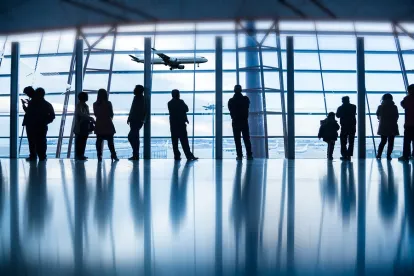There has been heightened interest and concern regarding the potential for U.S. Customs and Border Protection (CBP) to search laptops and smart phones at the port of entry, due to the mention of such searches in one of President Trump’s recent Executive Orders. But, the search of these devices is not new. In fact, this was started in 2008 and is a response to the increasing number of travelers carrying such devices. On March 16, 2017, CBP published an update reiterating their broad and long-held search authority on their website.
Can U.S. Customs and Border Protection (CBP) search a U.S. citizen’s personal electronic devices?
FACT: Yes, CBP has broad authority to search all items arriving to the United States. Specifically, 19 C.F.R. 162.6 states that, “All persons, baggage and merchandise arriving in the Customs territory of the United States from places outside thereof are liable to inspection by a CBP officer.” Unless exempt by diplomatic status, all persons entering the United States, including U.S. citizens, are subject to examination and search by CBP officers.
This authority is not new and has been used since 2008. CBP is able to review everything brought into the United States to determine whether the individual is eligible for admission to the United States and the purpose of the entry. This includes cell phones and laptops. CBP officers may search these devices on purely a “reasonable” suspicion.
CBP only selects suspicious applicants for admission for secondary inspection.
FALSE: Most individuals pass through the CBP inspection without fanfare. But, CBP officers have discretion to refer travelers for further examination. Although CBP does use information from various systems and specific techniques for selecting passengers for targeted examinations, they also use completely random referrals for a percentage of travelers.
Does CBP know who is arriving in the United States in advance?
FACT: Yes, CBP receives information for air travelers prior to their arrival to the United States. Air carriers transmit passenger information to CBP using the Advance Passenger Information System (APIS). CBP also receives information from the Interagency Border Inspection System) to target travelers for further inspection. IBIS is used by more than 20 federal agencies, including the FBI, IRS, Coast Guard, FAA, Secret Service, and the Department of State to share information. IBIS provides the law enforcement community with access to computer-based enforcement files of common interest, including access to the FBI’s National Crime Information Center (NCIC) and all 50 states via the National Law Enforcement Telecommunications Systems. Access to IBIS is available to computer terminals at air, land and sea ports.
Must I provide passwords to electronic devices and social media accounts?
FACT: Yes. At the port of entry many of your civil protections do not apply. Even less so, for travelers who are not U.S. citizens of Lawful Permanent Residents (green card holders). As such, you should be prepared to be cooperative and hand over electronic devices to the CBP officer for inspection. This includes providing passwords.
Can CBP retain my electronic devices?
FACT: Yes, electronic devices including laptops may be retained temporarily by CBP for further inspection. If it is retain, CBP will provide you with Form 6051-D, which is a receipt and a CBP Official who will be the “case officer.” There is no set time period for CBP to complete the inspection. In some cases, electronics may be held for several weeks. The only requirement is that CBP hold the property for “a reasonable time.” Since that is vague and varies based on circumstances, you should be prepared to be without your property for several days or weeks. CBP will ship the device back to you.
Recommendations made in Media, by Companies Due to Potential for Searches at Port of Entry:
Because modern life includes storing a great deal of information on our computers and cell phones, travelers can take a few simple steps to protect their information. Notably, this is particularly relevant for business travelers who have a duty to protect their company and client information.
-
Travel only with necessary devices and data. If you do not need a device – leave it at home.
-
Prepare devices for Travel. In cases where a device is needed during travel, there are steps that can be taken to protect your data. Much of the information we use today is not actually stored on our device – but in a cloud. Therefore, “clean” you device prior to travel and remove any information that is not needed for the trip. The cloud will continue to store important information. Meanwhile, having limited information on your device should limit the time CBP needs to spend to inspect it, reducing the risk of CBP retaining it for an extended search.
-
Take a “loaner.” For business travel, many companies or firms can offer a loaner laptop. IT departments regularly erase information from these computers since they are shared within the organization. This loaner can hold only the information needed for the trip.
-
Take a “Memory Stick.” Although memory sticks may seem a bit old fashioned these days, this can be to your advantage when getting through CBP inspections. Is CBP paying that much attention to memory sticks these days, when everyone is traveling with personal devices? Probably not. While CBP is focused on your cell phone with personal data; your company or client’s information on the memory stick may simply go unnoticed. The memory stick is light and easy to travel with, and it shouldn’t take CBP long to review the information should they chose to inspect it.
Lastly, international travelers should be aware that foreign governments are certain to reciprocate. Specifically, U.S. citizens traveling internationally will be subjected to the same digital inspection at foreign ports of entry. Therefore, this is a trend that will not only “stick” it will grow. We will need to be prepared for these intrusions on both ends of an international trip. Therefore, it is even more vital that we prepare our electronic devices for travel, the same way we plan every other aspect of an international trip.




 />i
/>i
